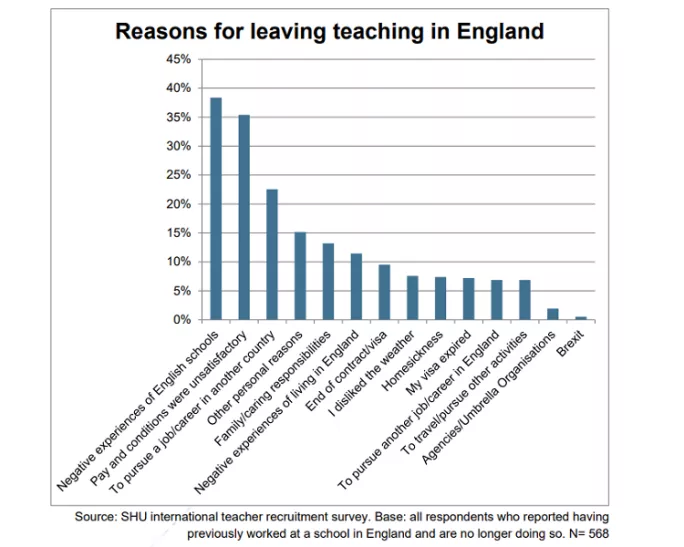- Home
- Overseas teachers quitting over pay
Overseas teachers quitting over pay

More than a third of international teachers leaving English schools say they quit over “negative experiences” or unsatisfactory pay, according to research published today.
The research on international teacher recruitment, published today by the Department for Education, found that 38 per cent of overseas teachers who had taught in England but were no longer doing so left due to “negative experiences of English schools”.
And 35 per cent said pay and conditions were unsatisfactory.

When asked if anything could have convinced them to continue, better pay was cited by 84 per cent of non-Europeans and 69 per cent of Europeans, while just 3 per cent mentioned workload and 2 per cent mentioned pupil behaviour.
More than four in five (83 per cent) of the 3,357 survey respondents did not hold qualifications in shortage subjects.
The research, carried out by Sheffield Hallam University and the University of Brighton, also found that most school leaders who had recruited internationally in the last three years said it was a “last resort” or an additional strategy for overcoming the local shortage of teachers - rather than a desirable option.
Schools found that it was harder to assess the quality of international recruits, meaning many were taken on short-term contracts, and often took a long time to acclimatise to living and working in England.
‘Implications of Brexit’
But there were benefits for schools, not just in filling vacancies, but in teachers bringing different experiences to schools including creative ways to teach and broadening student horizons.
“Two-thirds of schools that had recently recruited international teachers did not plan to recruit from abroad in future but would consider it again as a last resort if they could not find teachers nationally,” the report said.
And it added that the immediate impact of the Brexit vote had been ”unsettling”.
“Schools reported EU teachers leaving or pulling out of appointments and EU families/students leaving, reducing rolls with implications for staff cuts. The unknown medium and longer-term implications of Brexit were described as causing uncertainty for schools and staff.”
Teachers wanted to come to England out of a desire to live here or for career progression, the researchers found.
“In general, school leaders considered that international recruits often took a long time to acclimatise to living and working in England, and needed significant support,” the report said, adding that expectations around planning, assessment and target setting were one particular issue.
Schools often assigned recruits a mentor - but some also needed help with finding affordable accommodation and developing social networks.
The researchers asked 44 school leaders about their experiences of recruiting international teachers and had questionnaire responses from 3,357 teachers who trained in another country and obtained Qualified Teacher Status (QTS) between September 2014 and December 2016.
Of these teachers, 568 had worked in English schools and had since left - with almost half going to teach in other countries. A further 17 per cent had stayed in England but in other jobs, and the remainder reported a range of other activities.
Teachers in England have seen their salaries cut in real terms by 12 per cent over 10 years while, on average, their colleagues in other developed countries have seen wages rise, the Organisation for Economic Cooperation and Development (OECD) has revealed in September 2017.
And today’s research recommended that international teachers could be helped by providing them with “realistic” information on living costs in England, particularly in London and the South East, as well as expectations around preparation and assessment, working with the full ability range and pupils with SEND.
It also recommended that schools should consider providing “intensive support” to international teachers not just around their job, but also through buddying and practical issues.
But it concluded: “Nearly all school leaders were unequivocal in their belief that international recruitment should not, and could not, act as a substitute for policies that better ensured greater numbers of high-quality teachers being trained in England, and that ensured terms and conditions were sufficiently desirable to encourage the retention of existing teachers.”
Register with Tes and you can read two free articles every month plus you'll have access to our range of award-winning newsletters.
Keep reading with our special offer!
You’ve reached your limit of free articles this month.
- Unlimited access to all Tes magazine content
- Save your favourite articles and gift them to your colleagues
- Exclusive subscriber-only stories
- Over 200,000 archived articles
- Unlimited access to all Tes magazine content
- Save your favourite articles and gift them to your colleagues
- Exclusive subscriber-only stories
- Over 200,000 archived articles



